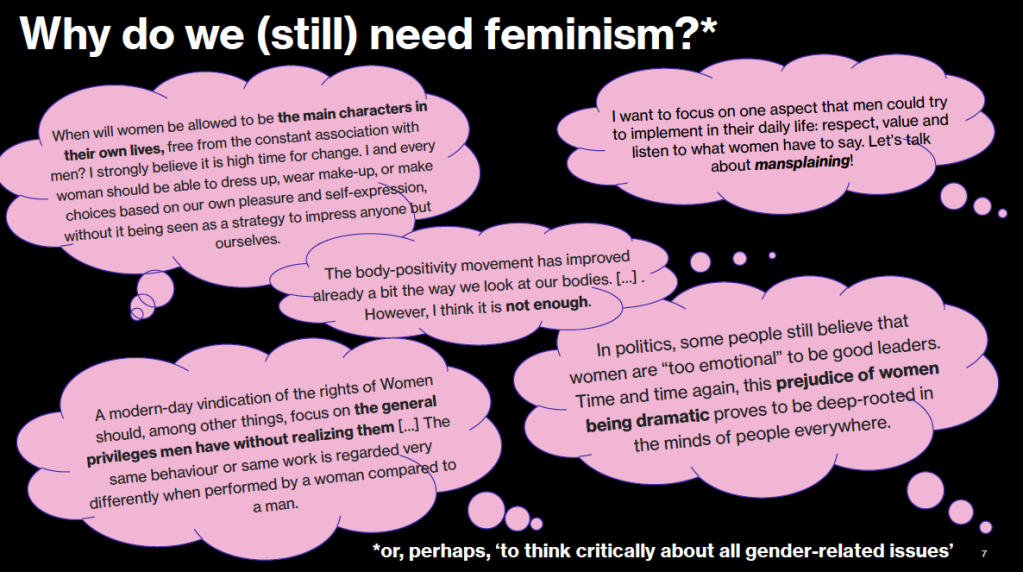By Carmen Chang,
On January 29, 2021, Sorbonne University hosted an insightful conference titled “Identities in Process: Relational Reiterations and Emotional Activations in Feminist Mobilizations” organized by the IMAGER-CRIIA-LER research units as part of the IBERHIS program. The event featured Dr. María Martínez, a sociologist from UNED and member of the feminist center at the University of California, who specializes in social identity and political mobilization with a particular focus on feminist movements and vulnerable women’s collectives.
Dr. Martínez’s presentation, based on her doctoral thesis reformulated from 2015, delved deeply into feminist identities understood not as fixed categories but as evolving processes strongly influenced by emotions and social relationships. Her work positions emotions and relationality at the core of feminist activism, suggesting that collective identities are continuously constructed and reaffirmed through social mobilizations.

Emotions as the Heart of Collective Feminist Identity
Martínez’s research challenges traditional sociological perspectives that have historically marginalized emotions as irrational or secondary. She stresses that emotions —both “negative” such as anger and fear, and “positive” such as love, joy, and solidarity— are essential forces that bind feminist groups together and activate their collective action.
While classical mass movement theories often prioritize rationality and collective utility, Dr. Martínez argues for an integrated approach acknowledging subjectivity and affectivity as key to understanding feminist activism. She emphasizes that emotional experiences are not simply reactions but foundational to the formation of political identities within feminist mobilizations.
From Individual Awareness to Collective Action
A central theme of the conference was how feminist activism arises from a complex interplay between individual consciousness and collective organization. Unlike male-dominated political movements of the 1980s that often emphasized individual agency and decision-making, feminist mobilizations frequently begin from shared emotional experiences and relational affinities.
Martínez highlighted the intricate social fabric of feminist groups, where bonds are not solely based on friendship but also on ideological affinities and common experiences of discrimination. These “affinity spaces” become vital nodes connecting diverse feminists who might not always align politically but share emotional commitments. The resulting networks—strengthened by repeated emotional interactions—create the dynamic social infrastructure for feminist protests and actions.
Emotional Activations in Feminist Marches and Strikes
The conference underscored the importance of public feminist demonstrations as arenas where emotions are collectively experienced and reiterated. Using examples such as the powerful feminist strikes of 2017 in Spain, Martínez described how participants engage in ritualized acts —marching, chanting, greeting— that weave a collective emotional fabric.
These public events crystallize feelings like anger, indignation, and helplessness over violence against women and gender inequality, transforming them into shared collective strength. Such emotions are crucial to mobilizing bodies in public spaces, giving visibility to feminist causes and forging solidarity.
Interestingly, Martínez also foregrounded the role of positive emotions, particularly love and solidarity among women activists, as counterweights to conflict and rivalry within the movement. This recognition of emotional diversity challenges simplistic depictions of feminist mobilizations as solely confrontational or conflict-ridden.
The Role of Social Media and Virtual Networks
The conference further explored how contemporary feminist activism extends beyond physical gatherings. Social media and digital networks have transformed feminist sociability by enabling emotional reiterations and relational connections to flourish virtually.
Dr. Martínez noted that these virtual spaces amplify emotional resonance, allowing activists to maintain collective identities and sustain mobilizations even without face-to-face contact. This evolution challenges conventional sociological understandings of social movements tied strictly to physical presence, urging scholars to consider the emotional and relational dimensions of online activism.

Theoretical and Methodological Reflections
The conference offered critical reflections on the theoretical tensions surrounding emotion in social science research. While emotion is often seen as undermining rationality, Martínez argued for a nuanced view where emotional and rational subjectivities coexist and mutually shape social movements.
She also advocated for qualitative, biographical methodologies that capture lived emotional experiences and relational networks among feminists. This approach enriches the understanding of how identities and political positions emerge from life histories, interpersonal ties, and affective investments.
Additionally, the conference discussed the moralization of law and politics, showing how feminist demands often translate emotional experiences of injustice into legal and institutional frameworks, thereby connecting personal affectivity with broader socio-political change.
Significance and Challenges
Overall, the conference presented a complex yet compelling picture of feminist identities as fluid, relational, and emotionally charged. Dr. Martínez’s work contributes to feminist theory by integrating emotions traditionally excluded from political analysis, thus broadening the scope of collective identity studies.
The conference also revealed the inherent challenges in studying such processes. The precarious and heterogeneous nature of feminist networks, ideological diversity, and the ephemeral quality of emotional activations require careful methodological strategies. Nonetheless, the event demonstrated the importance of embracing complexity to capture the richness of feminist mobilizations.
Conclusion
The conference “Identities in Process: Relational Reiterations and Emotional Activations in Feminist Mobilizations” was a significant contribution to interdisciplinary feminist scholarship. By highlighting the centrality of emotions and social relations, it urged a rethinking of collective identity beyond fixed categories and rationalist frameworks.
This event offers valuable insights for scholars, activists, and policymakers interested in social movements, gender studies, and political sociology. It suggests that understanding feminist mobilizations requires attention not only to ideological goals but also to the emotional ties that sustain collective action and transform identities.
Reference
- Martínez, María. “Identidades en proceso. Reiteraciones relacionales y activaciones emocionales en las movilizaciones feministas.” Conference, IMAGER-CRIIA-LER, Sorbonne University, January 29, 2021. IBERHIS Program.




